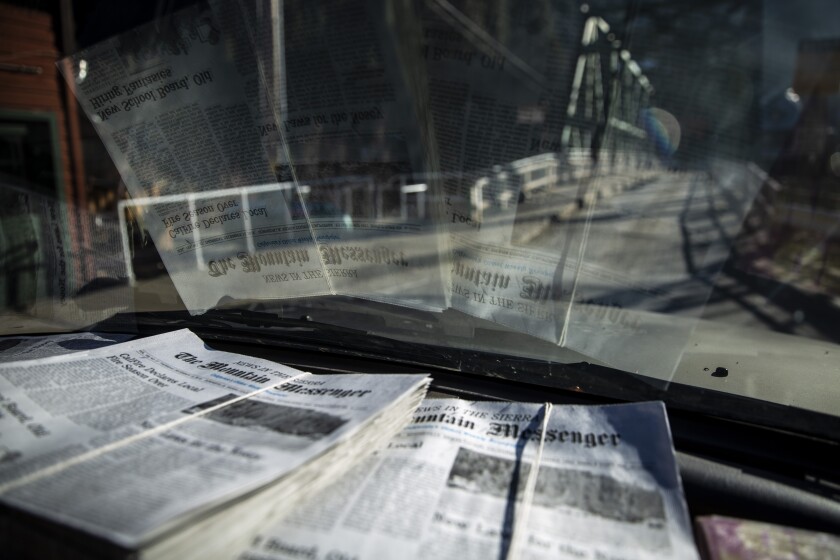Restart the presses: California’s oldest weekly newspaper saved
The Los Angeles Times, by Brittny Mejia, January 7, 2020
The state’s oldest weekly newspaper, which once published Mark Twain, will keep printing after a California retiree stepped in to save the day.
Carl Butz, a fourth-generation native Californian, is taking over the Mountain Messenger, which is based out of his hometown of Downieville.
The 71-year-old has been friends with Don Russell, the editor-publisher of the paper, since moving to the town in the 1990s and was aware of his troubles trying to sell the paper over the last year.
Russell planned to retire by the middle of January. On Thursday, he told the printer the paper would soon cease publication. Russell ran the numbers and told Butz, “It’s hopeless … don’t do this.”
The next day, Butz came in with a check.
“I said, ‘OK, it’s not going to cost that much — I’m going to save it,’” Butz said. “I’m going to try and make sure the thing survives.”
Butz is aiming for a nonprofit model and wants to rely on more volunteers to help fill the paper, which for a long time has fallen on the paper’s two full-time employees, Russell and Jill Tahija.
He’s already found a woman in Sierra City who wants to cover the Board of Supervisors meetings, he said, and staff will send out subscription renewal cards once more.

As newspapers shut down nationwide, Butz is happy to keep the Mountain Messenger going.
The Martinez News-Gazette printed its final edition last week, after 161 years of publishing. The paper, which covered the city of Martinez, the seat of Contra Costa County, had been losing money.“There’s just been this rash of these things across the country; you lose the community,” Butz said. “I think we need to have newspapers.”
The Mountain Messenger, which publishes on Thursdays, has a circulation of about 2,400. The paper dates to 1853, when it was started as a twice-monthly publication.
It became the Mountain Messenger in 1854 or 1855 and moved to La Porte, and then to Downieville, a Gold Rush community about 110 miles northeast of Sacramento.
The paper’s claim to fame is that Twain once wrote there while hiding out from the law. He was only there for a couple of weeks, writing under his real name, Sam Clemens, according to Russell, who read some of his articles on microfilm.
“They were awful,” Russell said in a previous interview with The Times. “They were just local stories, as I recall, written by a guy with a hangover.”
Russell became co-owner of the paper, known around the area as the “Mountain Mess,” in the early 1990s. The Jan. 16 edition will be his last in his current role.
“I don’t have to clean out the office. That’s a huge relief,” Russell said. He is planning to take a vacation with his wife on the 20th, but his association with the paper “will continue for the foreseeable future.”
“It’s the absolute best thing I could have hoped for,” he said. “I get to do the stuff I like to do and not have to do the stuff I don’t like to do.”
Also… as appearing in the Vallejo Times-Herald:
Man saves California’s oldest weekly newspaper from closure
Associated Press, January 8, 2020

DOWNIEVILLE, Calif. (AP) — A retiree has canceled an around-the-world trip to save California’s oldest weekly newspaper, which was set to shut down when its editor retires this month.
The paper began in 1853 as a twice-per-month publication; its claim to fame is that Mark Twain once wrote there under his real name, Sam Clemens. He was there hiding out from authorities in Nevada, where he had accepted a challenge to a duel after dueling had been outlawed, Don Russell, 70, the current publisher who is retiring told SFGate.
Carl Butz, 71, says he is taking over the Mountain Messenger, which is based out of his hometown of Downieville and covers two rural counties northeast of Sacramento. Terms of the deal were not immediately disclosed.
“I’ve been a widower for three years and this is a new chapter in my life,” Butz, who lives in an off-the-grid cabin, told SFGate. “What am I going to do? Go on another trip around the world? Instead, I’m doing something good for the community, and I feel good about it.”
Known around the area as the “Mountain Mess,” the paper covers school board meetings, federal land use and other issues.
Russell, the Mountain Messenger’s editor-publisher, told The Los Angeles Times he is planning to retire soon and had spent the past year trying to sell the paper but hadn’t received any offers.
Russell became co-owner of the paper in the early 1990s. The Jan. 16 edition will be his last in his current role but he said he plans to continue his association with the paper after he takes a vacation with his wife.
“It’s the absolute best thing I could have hoped for,” he said. “I get to do the stuff I like to do and not have to do the stuff I don’t like to do.”
A retired independent software consultant, Butz plans to run the weekly as a nonprofit and do some writing and editing. He will rely on volunteers to help fill the paper. He’s already found a woman who wants to cover the Board of Supervisors meetings, he said.
As newspapers shut down nationwide, Butz says he is happy to keep the Mountain Messenger going.
“There’s just been this rash of these things across the country; you lose the community,” Butz said.



You must be logged in to post a comment.